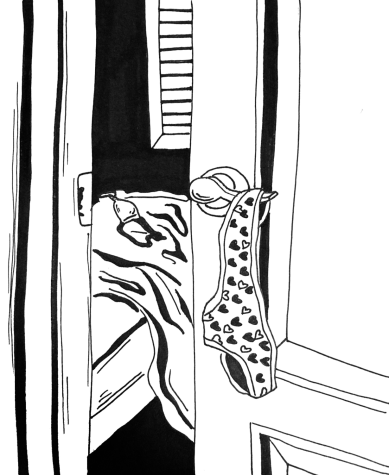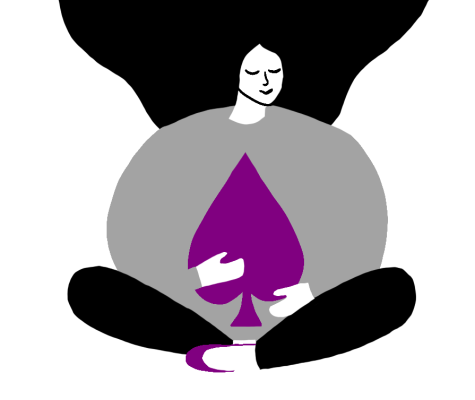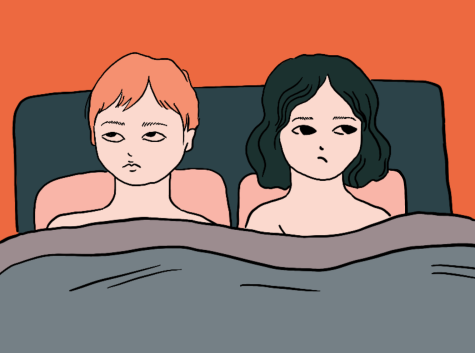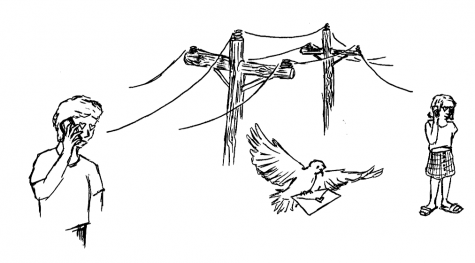Subverting sexpectations
April 21, 2022

Note: All of the names used in this article are pseudonyms.
“You’d like to stay anonymous, right?”
I’m perched on the edge of Rachel Sommer’s desk, tucked into the inner room of a divided double. Christian regalia covers her walls in varying pastels: a collection of pale blue Bible verses, soft pink flowers glued to a cross.
After Sommer confirms that, yes, she’d like to be anonymous, she gives me a sheepish grin.
“I think most people could probably guess, though,” she says, gesturing around her room. She’s referring to her state of virginhood.
By her own description, Sommer is a quiet, focused person. She wore a purity ring throughout high school and still keeps it in a box on her bedside table. If we rely on dominant ideas about sex and virgins, it might be easy to cast Sommer as one.
Before I go any further, I’ll need to address the words “virgin” and “virginity”—contentious terms, and rightfully so. The words, and the concept itself, are rooted irredeemably in misogyny; the term “virgin” emerged in medieval times to describe a woman who had not been penetrated by a penis. Her virginity, a sacred gift from a Christian God, was a virtue to be preserved until marriage. Failure to do so could result in dishonor and punishment.
Junior Viola Minor is happy to jokingly refer to herself as a “dumb lesbian virgin,” but has her qualms with the term.
“The concept of virginity is something that I see as a tool which was created to shame people, particularly women, who are sexually active before marriage,” Minor said via email to The Wire. “The idea that somehow not engaging in any type of sexual activity reflects on the person’s purity, morality and worth is just very unsettling to me.”
Historically, we’ve equated virginity with purity and worth, though there is little consensus around its actual definition. It also explicitly centers heterosexual, penetrative sex, excluding people who engage in other types of sex. Virginity is now largely considered to be a myth, with no standardized definition or bearing on one’s health.
Still, shame remains, but in left-leaning and largely secular environments like Whitman, it reaches in a different direction. Rather than sexually active people experiencing shame or judgment, it often lands on those not engaging in sex.
The word “virgin” likely evokes two over-the-top images: one long-skirted and religious (as Sommer pointed to), one isolated and bitter. The divine and the incel (involuntary celibate).
Morris Day would like to clarify that he falls under neither designation.
“I feel like the term ‘incel’ comes up sometimes,” Day said. “I’m not that. It’s very much my choice.”
“Volcel,” I supplied. Voluntary celibate—I hate that I know this term.
“Volcel,” he said. “It’s not like I’m, you know, super religious or anything, either. It just hasn’t happened for me.”
I asked Day if there was a particular reason that he hadn’t had sex—not that there needs to be one, I was quick to add. He explained that, as a gay man, it came down to lack of options.
“I grew up as the only gay person at my high school. Like, in my hometown, really,” he said. “There just aren’t really that many gay guys here—ones that I’m attracted to, at least. So it just hasn’t happened. And that’s fine.”
When asked about Whitman’s hookup culture, Day noted that, in his experience, it differs for gay students.
“I’m gay. There’s, like, eight of us. We all know each other. So, yeah, that’s kind of awkward too.”
Day also noted that, while, he’s comfortable as someone who hasn’t had sex, it’s a bit “cringe.” This, in spaces like Whitman, is where the shame often lies. Virgins become the butt of the joke, in offhand remarks and Instagram accounts like @whitmanvirginityclub. Virginity is seen as embarrassing, and college-aged virgins tend to see themselves as anomalies. Really, as of 2015, roughly 41% of incoming college first-years hadn’t yet had sex. Around 20% of students graduated college without having sex.
Likely, these statistics suggest that an even smaller proportion of college students are having regular sex. These numbers account for anyone who’s had any previous sexual experiences, some of whom likely undergo periods of sexual inactivity. When we think of college, we may imagine a cesspool of constant sexual activity, but a surprisingly large number of people exist outside of this perception.
Sommer was surprised to hear these statistics—aside from a few friends also abstaining for religious reasons, she feels like everyone around her is sexually active.
“I think that’s a large part of why my closest friends here are from religious life,” Sommer said. “Even if people aren’t actively having sex, it seems like something that they’re maybe pursuing … when it’s just not part of my life at all.”
For first-year Ace Anonymous, sex is similarly insignificant. Ace identifies as a sex-neutral asexual person, who is neither repulsed nor enticed by the prospect of sex.
“I’m not going to, like, get ill at the thought of having sex with someone,” she said. Sex is simply not something she spends much time thinking about, nor is it something she actively pursues.
“If it happens, it happens. If it doesn’t, it doesn’t. And for me, that’s just fine.”
In regards to sex and sexuality, Ace grew up in an environment very different from Whitman. Coming of age at a religious school in Texas, she ran into issues trying to “explain where [she was] coming from.”
“The way sex was taught to us was always in the way of abstinence, so I would never have a problem with it anyway … But the automatic expectation is, like, heterosexual.”
In her social circles here at Whitman, Ace doesn’t feel any pressure nor stigma around not having sex, but notes that a sort of expectation arises in the larger community. She rarely wishes to actively participate in discussions about sex, but understands why they need to happen. Though she tends to avoid these types of conversations, she acknowledges that dialogue around healthy sex is critical on campus.
“It’s just not really where my priorities are at the moment,” she said.
Sommer agreed. Even as someone who doesn’t plan to be sexually active during her time at Whitman, she recognizes the need for conversations about consent and sexual health and for more robust sexual advocacy programs.
“I’m not having sex on campus, and I won’t be unless I happen to get married before I graduate,” she said, “but I know that a lot of my peers are … I just hope everyone is safe.”
However, Sommer also addressed the need for the conceptual expansion of this programming. Ideally, she says, Whitman’s education around sex and relationships would also normalize the option of not having sex.
“I want to be careful here, because obviously I have a limited perspective as someone who’s abstaining,” she said. “But I do think it’s dangerous to make people feel like having sex in college is the default, and anything else is weird … Maybe if people felt like waiting was more normal, and didn’t feel that shame around it, more people would wait until they were ready, and they might have more positive experiences.”
Minor agreed that some less-than-ideal relationships stem from the misconception that lack of sexual or romantic connection means lack of love or intimacy.
“This is not meant to call out anyone, but there are definitely people out there (both at Whitman and in general) who try to use sex and relationships as tools for not being lonely,” she said. “And I just wanted to say that if we were encouraged more to be physically intimate with our friends (hugs, holding hands, and just basic cuddling), as well as if we stopped with portraying single people as tragic for not having anyone, way less people would be in crappy relationships because they don’t know how to be alone.”
So, what might this expanded education look like? Sommer would like facilitators to model discussions with partners about waiting, as she theorizes that most people don’t know how to broach the topic. She also wishes more people knew how common it was to enter (and even exit) college without any sexual experience.
Minor called for a redefinition of sex positivity, one that is equally respectful and encouraging towards those not having sex.
“For those people who claim to be sex positive, but cannot comprehend that some people are abstaining from it by their own free will, or are asexual, yeah, stop, you are not really sex positive,” she said. “Pushing your idea of what sex is and how everyone should be having it is a bad idea overall, and can also make others feel alienated.”
Ace Anonymous agreed.
“More awareness just for asexual people on campus would be appreciated … just because there are people who are asexual who try to get into relationships, and just having that conversation with their partners can be really tricky.”
“[The concept of virginity] kind of shows our obsession with sex as a society,” Minor said. “I mean, we could have made up a bunch of words for not doing other things, like, ‘Oh yeah, Mike here is a total virgin, he never went to a concert before!’”
As Minor points out, virginity is a construct. The stigma associated with virginity is antiquated and tied to misogyny. Having sex or not having sex shouldn’t be a source of shame. We’re all virgins somehow!
All names used in this article are pseudonyms.








